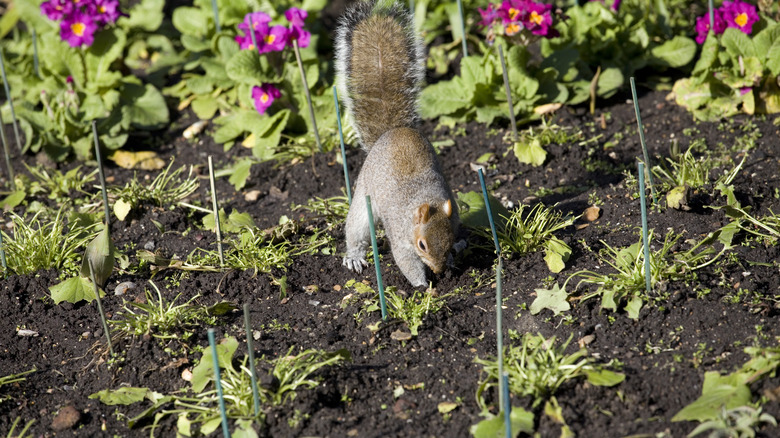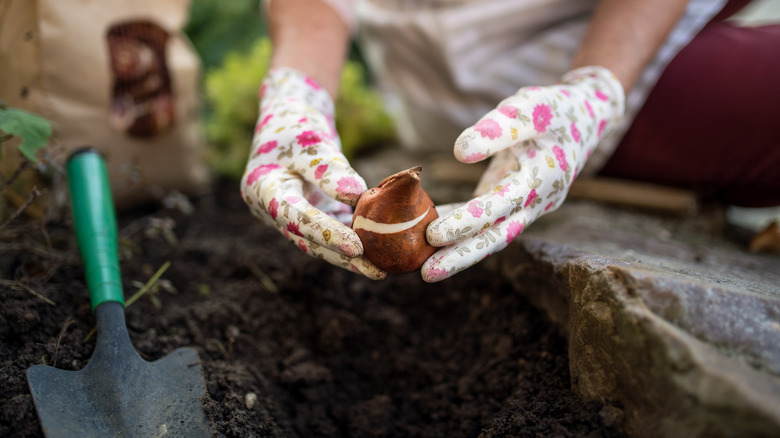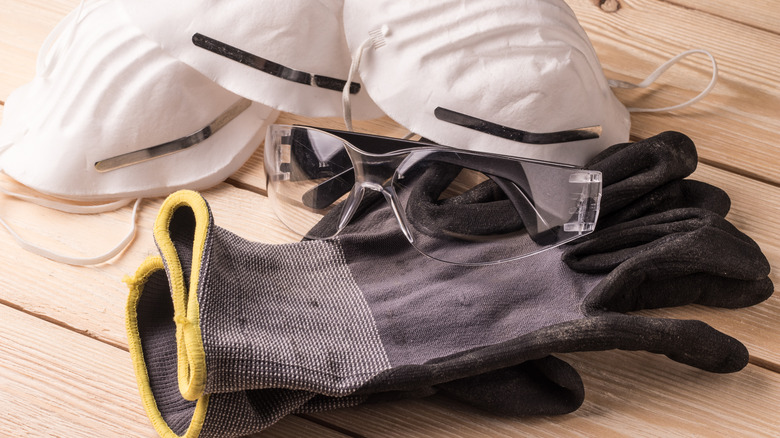Does Thiram Really Keep Squirrels Away From The Bulbs In Your Garden?
Of all the different ways to get rid of squirrels, one that isn't as well known is a fungicide called thiram. Commonly used in commercial agriculture, this chemical works by creating a very unpleasant taste and smell that repels critters, including squirrels, when applied to a garden area. Thiram-treated bulbs experience less squirrel damage when compared to untreated ones as the animal instinctively avoids the bitter taste. The effectiveness typically lasts through the fall planting season when squirrels are most active, though it will diminish over time as the chemical breaks down into the soil.
While thiram does repel squirrels in most cases, its actual performance depends on several things. The treatment works best on newly planted bulbs rather than established plants since you can coat them prior to planting. It's particularly effective for spring-blooming bulbs like tulips and crocuses, which squirrels and other wildlife find quite appealing. However, a determined squirrel may still dig up your bulbs out of curiosity before even discovering that they taste bad. This could mean, even with a deterrent, you might still lose some plants. The chemical itself doesn't actually harm the squirrels in low levels, but it should create a strong enough response that they'll typically avoid returning to the area altogether once they've discovered it's bad. For households with curious pets or young children, you may want to avoid thiram altogether. Consider safer alternatives like cayenne pepper or wire mesh barriers to protect your bulbs.
How to properly use thiram for squirrel control
Using thiram effectively to keep squirrels from digging up your bulbs requires some careful application to maximize its usefulness and ensure safety. One thing to remember, though, is that despite its effectiveness, it is often only used in commercial agriculture and not as a home remedy. Be prepared to wear a considerable amount of protective gear. Thiram poses an even bigger risk to children and pets if ingested, inhaled, or absorbed through skin. This could cause symptoms like nausea, vomiting, and skin irritation, so make sure you keep the kids away when preparing the bulbs. After planting, use a protective barrier around the garden bed or keep your pets inside so they can't access the treated bulbs.
The EPA recommends a mixture of 1 1/2 pints of thiram to 8 gallons of water, which breaks down more easily for home use to 3 ounces of the repellent with 1 gallon of water. Dip the bulbs in and allow them to get coated evenly. After dipping, allow the bulbs to sit and dry completely prior to planting them. During planting, cover the bulbs completely with soil so they're not sticking out above the ground. Finally, make sure to store any unused product in its original packaging and keep kids and pets away from it.
Important safety considerations when using thiram
While thiram can effectively deter squirrels, there are several important precautions you should take when using it. The chemical is considered toxic, which means you must use gloves, masks, and protective eyewear when messing with it. It can be very harmful if ingested or inhaled, and proper storage is crucial. Always use the original container, keep it away from heat, and make sure the seal is tight when storing it. Thiram will break down into toxic compounds in soil over time, and although it is used in commercial agriculture, you should avoid using it in a home garden where vegetables or other edible plants will grow.
Environmental impacts are another consideration when using thiram. It can be quite toxic to aquatic life if it reaches waterways through runoff, making it unusable for those who have gardens near ponds or streams. There are other methods of squirrel deterrents out there that contain natural ingredients for those looking for a more eco-friendly repellent. You can also avoid pesticides completely by planting specific herbs to help keep squirrels out of your garden. If you do plan to use thiram, though, make sure you check any local regulations, as it can be restricted in some areas. Proper disposal of unused product is also important, so never dump it down the drain or toss it into your regular trash.


